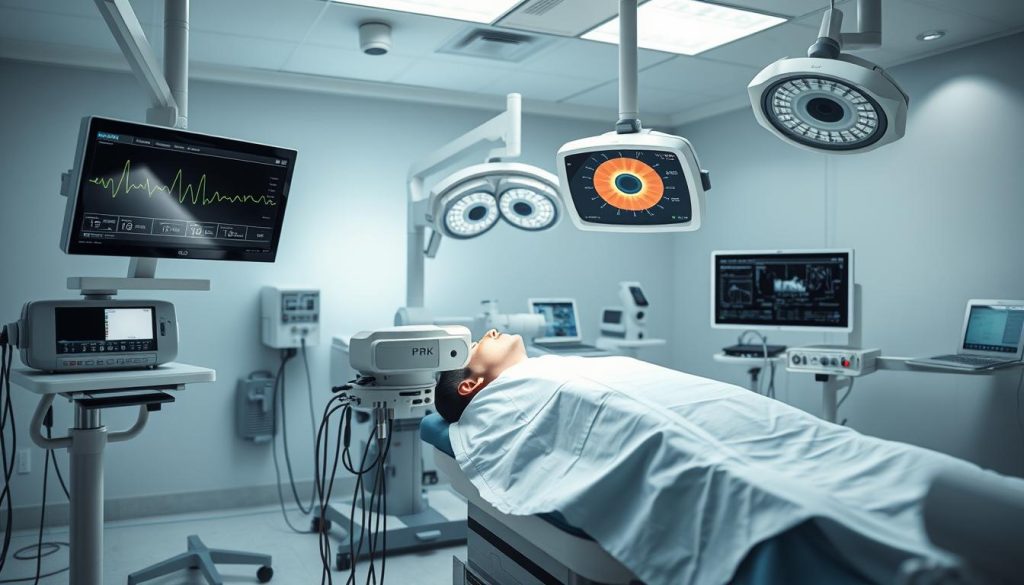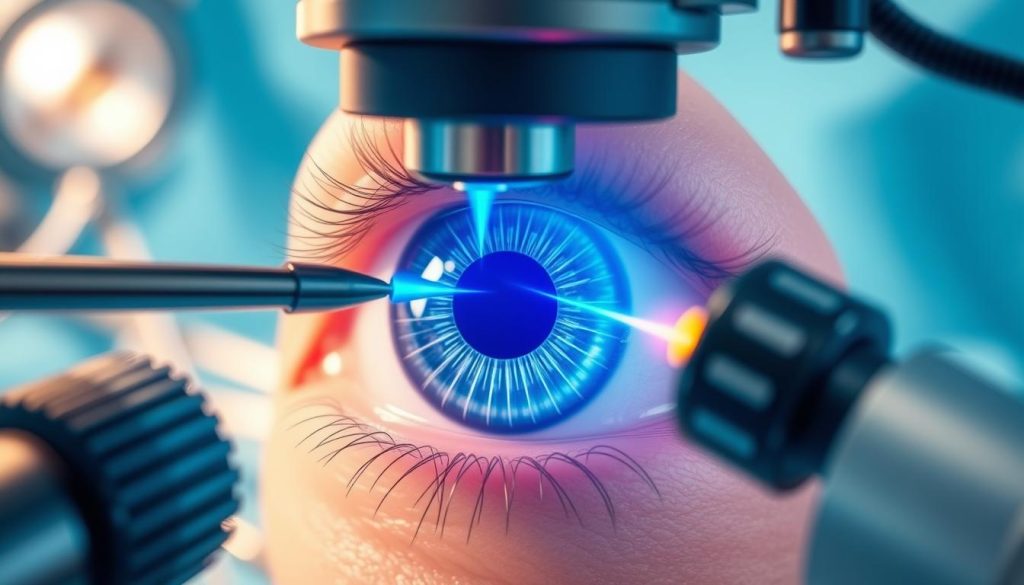PRK eye surgery is changing lives for those tired of glasses and contacts. This vision correction method offers clear eyesight without the daily struggle of corrective eyewear.
Those with myopia, hyperopia, or astigmatism can find relief with PRK. The surgery changes the shape of the cornea. This lets light focus right on the retina, improving vision for many.
PRK has a high success rate, with over 90% of patients seeing better. The recovery takes a few weeks. Most people get clear vision in two to six weeks after the surgery.
Let’s dive into PRK’s benefits, risks, and how it stacks up against other options. This info will guide you in choosing the best for your eye care journey.
Understanding PRK Eye Surgery: A Complete Guide
PRK eye surgery, short for photorefractive keratectomy, is a cutting-edge laser eye surgery. It reshapes the cornea to fix vision issues. This way, you can see clearly without glasses or contacts.
The Science Behind Photorefractive Keratectomy
Photorefractive keratectomy uses an excimer laser to remove tiny layers of tissue from the cornea’s surface. This reshaping fixes nearsightedness, farsightedness, and astigmatism. The laser’s cool ultraviolet light beams reshape the cornea carefully, without harming nearby tissues.
How PRK Differs from Other Vision Correction Methods
PRK is different from LASIK, another common laser eye surgery, in how it reshapes the cornea. LASIK makes a flap in the cornea, but PRK removes the outer layer. This makes PRK better for people with thin corneas or certain eye issues that LASIK can’t handle.
| Feature | PRK | LASIK |
|---|---|---|
| Corneal Treatment | Surface ablation | Flap creation |
| Recovery Time | Longer | Shorter |
| Suitable for Thin Corneas | Yes | No |
Historical Development of PRK Technology
PRK started in the 1980s as the first successful laser eye surgery. It opened the door for vision correction procedures, getting FDA approval in 1995. Over time, better laser technology has made PRK more precise and effective, making it a reliable choice for vision correction today.
Who Is an Ideal Candidate for PRK Surgery?
PRK eye surgery can help many people see clearer. It’s for those with certain eye types and health. Knowing if PRK is right for you is key to good eye care.

Age is important for PRK. It’s usually for adults over 18 with steady vision. Your eye doctor will check your eye health, like corneal thickness and shape. PRK is great for people with thinner corneas, a plus for some over LASIK.
PRK can fix common vision issues:
- Nearsightedness (myopia)
- Farsightedness (hyperopia)
- Astigmatism
Your health is also a factor. The best candidates are those without certain diseases and not pregnant or nursing. It’s important to know what PRK can do. While many see 20/20 or better, some might need glasses for certain things.
A detailed eye exam will tell if PRK is for you. Your eye doctor will check your vision, measure your cornea, and talk about your lifestyle. This careful check makes sure PRK is the best choice for you.
PRK vs LASIK: Choosing the Right Vision Correction Procedure
Deciding between PRK and LASIK can be tough. Both are well-liked for fixing vision problems, but they work differently. Let’s look at each to help you decide.
Key Differences in Surgical Techniques
PRK and LASIK change the cornea in different ways. LASIK lifts a flap, while PRK scrapes off the top layer. This affects how quickly you see better and how you feel during recovery.
| Aspect | PRK | LASIK |
|---|---|---|
| Corneal Treatment | Surface ablation | Flap creation |
| Initial Discomfort | Higher | Lower |
| Suitable for | Thin corneas | Normal corneas |
Recovery Time Comparison
PRK takes longer to recover than LASIK. LASIK patients often see better in a day. But PRK patients might take days to a week to notice big improvements.
Long-term Results and Effectiveness
Both PRK and LASIK fix vision well over time. PRK is good for thin corneas or those worried about eye injuries. LASIK is faster but not for everyone.
PRK is a great option for those who can’t have LASIK because of corneal thickness or other reasons.
Choosing between PRK and LASIK depends on your eyes, lifestyle, and what you prefer. Talk to an eye doctor to find the best fit for you.
The Step-by-Step PRK Surgical Process
PRK eye surgery is a precise and efficient procedure that corrects vision problems. It reshapes the cornea to improve eyesight. This eye laser treatment involves several carefully executed steps.

The process starts with the patient lying down comfortably. Eye drops numb the eye, ensuring a painless experience. The surgeon then gently removes the thin outer layer of the cornea, known as the epithelium.
Next, the excimer laser comes into play. This advanced technology reshapes the cornea with incredible accuracy. The laser treatment typically lasts less than a minute per eye, targeting the specific areas that need correction.
After the laser reshaping, the surgeon applies a protective bandage contact lens. This lens helps the epithelium regrow and protects the eye during the initial healing phase.
| PRK Step | Duration | Purpose |
|---|---|---|
| Epithelium Removal | 1-2 minutes | Prepare cornea for laser |
| Laser Reshaping | 30-60 seconds | Correct vision |
| Bandage Lens Application | 1 minute | Protect and aid healing |
The entire PRK eye surgery usually takes about 15 minutes per eye. Patients can typically go home the same day. Follow-up appointments are scheduled to monitor healing progress.
Benefits and Advantages of PRK Eye Surgery
PRK eye surgery has many benefits for those looking to correct their vision. It reshapes the cornea to improve eyesight. This means you don’t need glasses or contacts.
Visual Acuity Improvements
Many people see a big improvement in their vision after PRK. Most can see 20/20 or better. This makes daily activities easier without needing glasses or contacts.
The precision of PRK can give you sharper vision than glasses or contacts. Your eyesight can be clearer and more precise.
Long-term Stability
PRK results last a long time. It’s different from some other vision correction options that may need more surgeries. You can enjoy your improved vision for years without needing adjustments.
Reduced Risk of Complications
PRK is safer than some other eye surgeries. It doesn’t involve a corneal flap, which can cause problems. This makes PRK a good choice for people with thin corneas or jobs that might risk eye injuries.

| Benefit | Description |
|---|---|
| Improved Vision | 20/20 or better in most cases |
| Long-term Results | Stable vision for many years |
| Safety | Lower risk of corneal complications |
| Candidacy | Suitable for thin corneas |
Potential Risks and Side Effects of PRK
PRK eye surgery, like other laser surgeries, has some risks and side effects. Most people have good results, but it’s important to know about possible problems.
Common side effects right after PRK include:
- Discomfort or mild pain
- Light sensitivity
- Blurred vision
- Dry eyes
These symptoms usually go away in a few days to weeks as your eye heals. But, in rare cases, serious problems might happen:
- Infection
- Corneal haze
- Under or over-correction of vision
- Delayed healing
To lower risks, follow your surgeon’s post-op instructions closely. This means using eye drops as directed, not rubbing your eyes, and going to all follow-up visits.
Even though PRK is safe and works well for many, it’s key to talk about your personal risks with your eye doctor. They can help decide if PRK is right for you, considering your situation.
“PRK surgery has come a long way in terms of safety and effectiveness. With proper care and adherence to post-operative guidelines, most patients experience excellent outcomes.”
PRK Surgery Recovery Timeline
Knowing the PRK recovery process is key for those getting vision correction. This timeline helps you understand what to expect and guides you through healing.
Immediate Post-operative Care
Right after PRK surgery, your eyes need extra care. You’ll wear protective contact lenses and use eye drops as prescribed. Managing pain is important in the first 48 hours. Rest your eyes and avoid bright lights to help them heal.
Weekly Recovery Milestones
Week 1: Your eye doctor will remove the bandage contact lens. Your vision will start to improve, but it might be blurry. You’ll notice less light sensitivity. Week 2-3: You can go back to work and normal activities. Your vision will keep getting sharper. Week 4: Most people can see well enough for daily tasks.
Long-term Healing Process
It takes time for your vision to fully stabilize after PRK. Months 1-3: Your vision quality will keep getting better. Months 3-6: Most people reach their final vision correction. Some might see small changes. Year 1 and beyond: Your vision usually stays stable, with regular check-ups to keep an eye on your eye health.
| Time Frame | Recovery Milestone |
|---|---|
| 48 hours | Peak discomfort, strict eye protection |
| 1 week | Bandage lens removal, improved comfort |
| 1 month | Return to most normal activities |
| 3-6 months | Vision stabilization, final results |
Remember, everyone’s PRK recovery is different. Stick to your surgeon’s advice for the best results.
Cost Factors and Insurance Coverage for PRK
PRK cost depends on several things. The surgeon’s skill, where the clinic is, and the technology used all affect the price. In the United States, PRK usually costs between $1,500 and $3,000 per eye. It’s often cheaper than LASIK because it’s simpler.
Many clinics offer ways to make PRK more affordable. They might have payment plans or medical credit cards. It’s key to talk about money with your provider before surgery.
Insurance for PRK is not common. Most plans see it as an elective and don’t cover it. But, some exceptions exist. For example, if PRK is needed because of an injury, insurance might help pay for it.
| Factor | Impact on PRK Cost |
|---|---|
| Surgeon Experience | Higher experience may increase cost |
| Clinic Location | Urban areas tend to be more expensive |
| Technology Used | Advanced equipment can raise prices |
| Pre/Post-op Care | Comprehensive care may add to total cost |
When thinking about PRK, remember all the costs involved. This includes exams before surgery, meds after, and follow-up visits. Knowing all the costs helps you make a smart choice about this life-changing surgery.
Preparing for Your PRK Procedure
Getting ready for PRK eye surgery is a big step. It involves several key steps to ensure the best outcome. This preparation phase is key for a successful procedure and smooth recovery.
Pre-operative Consultations
Your journey starts with a thorough eye exam. Your eye doctor will check your eye health and talk about your vision goals. They’ll explain the PRK process and answer any questions you have.
Lifestyle Adjustments
In the weeks before your PRK procedure, you’ll need to make some changes:
- Stop wearing contact lenses at least two weeks before surgery
- Avoid eye makeup and facial creams on the day of the procedure
- Arrange for someone to drive you home after the surgery
- Plan to take time off work for recovery
Required Medical Tests
Your doctor will do several tests to check if you’re a good candidate for PRK eye surgery. These tests may include:
| Test | Purpose |
|---|---|
| Corneal topography | Maps the surface of your eye |
| Pupil dilation | Allows for a detailed retinal examination |
| Refraction measurement | Determines your exact vision prescription |
| Tear film evaluation | Checks for dry eye syndrome |
By following these steps, you’ll be ready for your PRK procedure. You’ll be on your way to improved vision without glasses or contacts.
Post-operative Care and Management
After your eye laser treatment, it’s important to follow the right steps for recovery. Your surgeon will give you specific instructions. Here’s a general guide to help you with post-operative care.
Eye drops are key to your recovery. You’ll need to use prescription drops to prevent infection and reduce inflammation. Make sure to follow the schedule exactly for the best healing.
Wearing protective eyewear is a must during the initial recovery phase. Use sunglasses outdoors to protect your eyes from bright light and dust. At night, use the eye shields provided to prevent accidental rubbing.
- Avoid rubbing your eyes
- Stay away from smoky or dusty environments
- Refrain from swimming or using hot tubs for at least two weeks
- Take breaks from screens to prevent eye strain
Expect some discomfort and vision changes in the first few days. This is normal and will get better. If you have severe pain or sudden vision changes, call your doctor right away.
“Most patients see significant improvement within the first week, but full recovery can take up to three months.” – Dr. Sarah Johnson, Ophthalmologist
Regular follow-up appointments are important for monitoring your recovery. Your doctor will check on your healing and adjust your treatment plan if needed.
| Recovery Timeline | Activities | Care Instructions |
|---|---|---|
| Days 1-3 | Rest, minimal screen time | Frequent eye drops, wear protective shields |
| Week 1 | Light activities, no driving | Continue drops, attend follow-up appointment |
| Weeks 2-4 | Resume normal activities | Use artificial tears, protect eyes from UV |
| Months 1-3 | All activities permitted | Regular check-ups, maintain eye hygiene |
Advanced Technology in PRK Eye Surgery
PRK eye surgery has evolved a lot. Today, it uses the latest technology for better precision and safety. Let’s look at the new advancements that are changing corneal reshaping and improving results for patients.
Latest Laser Systems
Modern PRK uses advanced excimer lasers. These lasers are very accurate in reshaping the cornea. They can remove tiny layers of tissue with great precision, fitting the treatment to each eye’s unique shape.
Tracking and Mapping Innovations
Wavefront-guided and topography-guided treatments have changed PRK. These technologies make detailed maps of the eye’s surface and inside. Surgeons use this info to tailor the laser treatment, fixing even small irregularities in the cornea’s shape.
Safety Enhancement Features
Eye-tracking systems and iris recognition technology have made PRK safer. These features keep the laser focused even if the eye moves during surgery. This accuracy lowers risks and boosts the surgery’s success rate.
As technology keeps improving, PRK eye surgery gets better and safer. These new tools not only improve corneal reshaping but also lead to faster healing and better vision for patients.
Success Rates and Patient Satisfaction
PRK eye surgery is very successful in correcting vision. Studies show that a big number of patients see 20/20 or better after the surgery. How well PRK works depends on the patient’s starting vision and following the care instructions after surgery.
Many patients are very happy with PRK. They say it has greatly improved their life and reduced their need for glasses. Here are some numbers:
| Outcome | Percentage |
|---|---|
| Patients achieving 20/20 vision or better | 90% |
| Patients reporting improved quality of life | 95% |
| Patients no longer needing corrective lenses | 85% |
These numbers show PRK is a good choice for vision correction. People with more severe nearsightedness often see the biggest improvements. But, success can also depend on the patient and the surgeon’s skill.
“PRK changed my life. I no longer struggle with glasses or contacts, and my vision is crystal clear.”
Even though PRK works well, it’s important for people thinking about it to have realistic hopes. They should talk to a skilled eye doctor about their situation.
Comparing PRK with Other Laser Eye Treatments
PRK is a top choice for those looking for a lasik alternative. It’s known for its unique benefits, making it a great option for some. Let’s look at how PRK compares to other laser eye treatments to help you decide.
PRK reshapes the cornea differently than LASIK. In PRK, the outer cornea layer is removed before the laser treatment. LASIK, by contrast, creates a flap in the cornea. This makes PRK better for people with thinner corneas or who play sports.
SMILE (Small Incision Lenticule Extraction) is another option. It creates a small lens in the cornea, which is then removed through a small cut. SMILE might cause less dry eye than LASIK, but it’s mainly for nearsightedness.
| Procedure | Recovery Time | Suitable For | Corneal Impact |
|---|---|---|---|
| PRK | 1-2 weeks | Thin corneas, active lifestyles | Surface ablation |
| LASIK | 24-48 hours | Most refractive errors | Flap creation |
| SMILE | 24-48 hours | Nearsightedness | Minimal incision |
When picking a refractive surgery, think about your corneal thickness, lifestyle, and vision needs. Talk to an eye doctor to find the best procedure for you.
Long-term Results and Vision Stability
Photorefractive keratectomy (PRK) gives lasting vision correction to many. It reshapes the cornea, making sight clear without glasses or contacts. Let’s look at the long-term results and what to expect years later.
Five-Year Outcomes
Studies show PRK results stay stable for most over time. After five years, many keep 20/20 vision or better. Some might see small changes, but these are usually minor.
The success rate for long-term vision improvement is high. This makes PRK a reliable choice for vision correction.
Vision Quality Maintenance
Keeping good vision after PRK involves several factors. Age can affect eyesight over time. Regular eye care and a healthy lifestyle help keep vision quality high.
Some patients might need reading glasses as they age. But this is normal for everyone.
Follow-up Requirements
After PRK, follow-up visits are key. Your doctor will check your eyes at set times:
- 1 day after surgery
- 1 week after surgery
- 1 month after surgery
- 3 months after surgery
- 6 months after surgery
- Yearly after the first year
These visits help catch any issues early. They ensure your eyes heal right and vision stays stable. If needed, your doctor can suggest treatments to keep your sight improved. With proper care, PRK can offer long-lasting vision correction for many years.
Choosing a Qualified PRK Surgeon
Finding the right surgeon for your PRK eye surgery is key. Look for a board-certified ophthalmologist with lots of experience in laser eye surgery. Check their credentials and success rates with PRK procedures. Being a member of professional groups like the American Academy of Ophthalmology shows they’re experts.
Ask about their PRK surgery experience and the technology they use during your consultation. A good PRK surgeon will explain the procedure well and answer your questions. They should also talk about their complication rates and how they handle any problems.
Trust your gut when picking a PRK surgeon. You should feel at ease and confident with their approach. Remember, PRK eye surgery is a big decision. Take your time to research and talk to several professionals before you decide.
FAQ
Q: What is PRK eye surgery?
A: PRK (Photorefractive Keratectomy) is a laser eye surgery. It reshapes the cornea to fix vision problems like nearsightedness and astigmatism. Unlike LASIK, it doesn’t need a corneal flap.
Q: How does PRK differ from LASIK?
A: PRK removes the outer cornea layer before reshaping. LASIK creates a flap. PRK takes longer to recover but is safer for thin corneas.
Q: Who is an ideal candidate for PRK?
A: Adults with stable vision and healthy eyes are good candidates. It’s also for those with thin corneas or dry eyes. It’s safer for jobs with eye injury risks.
Q: What is the recovery time for PRK?
A: Recovery starts in 3-5 days. Vision gets better in a week or two. But, it can take months for full recovery.
Q: Is PRK painful?
A: You might feel discomfort and sensitivity in the first days. Doctors use pain meds to help.
Q: What are the success rates of PRK?
A: PRK works well, with over 90% of patients happy with their vision. Many see 20/20 or better.
Q: How long do PRK results last?
A: PRK results last a long time. Most people keep their vision improved for years. But, some vision changes can happen with age.
Q: What are the risks of PRK?
A: Risks include infection and dry eyes. But, serious problems are rare with a skilled surgeon.
Q: How much does PRK cost?
A: PRK costs
FAQ
Q: What is PRK eye surgery?
A: PRK (Photorefractive Keratectomy) is a laser eye surgery. It reshapes the cornea to fix vision problems like nearsightedness and astigmatism. Unlike LASIK, it doesn’t need a corneal flap.
Q: How does PRK differ from LASIK?
A: PRK removes the outer cornea layer before reshaping. LASIK creates a flap. PRK takes longer to recover but is safer for thin corneas.
Q: Who is an ideal candidate for PRK?
A: Adults with stable vision and healthy eyes are good candidates. It’s also for those with thin corneas or dry eyes. It’s safer for jobs with eye injury risks.
Q: What is the recovery time for PRK?
A: Recovery starts in 3-5 days. Vision gets better in a week or two. But, it can take months for full recovery.
Q: Is PRK painful?
A: You might feel discomfort and sensitivity in the first days. Doctors use pain meds to help.
Q: What are the success rates of PRK?
A: PRK works well, with over 90% of patients happy with their vision. Many see 20/20 or better.
Q: How long do PRK results last?
A: PRK results last a long time. Most people keep their vision improved for years. But, some vision changes can happen with age.
Q: What are the risks of PRK?
A: Risks include infection and dry eyes. But, serious problems are rare with a skilled surgeon.
Q: How much does PRK cost?
A: PRK costs $1,500 to $3,000 per eye in the U.S. Prices vary by surgeon, technology, and location.
Q: Is PRK covered by insurance?
A: Insurance usually doesn’t cover PRK. But, some plans might for certain conditions. Check with your provider.
Q: How should I prepare for PRK surgery?
A: Get ready by attending consultations and stopping contact lens use. Avoid certain meds and plan for aftercare.
Q: What advanced technologies are used in PRK?
A: PRK uses wavefront-guided treatments and eye-tracking systems. These ensure precise and personalized correction.
Q: How do I choose a qualified PRK surgeon?
A: Choose a board-certified ophthalmologist with PRK experience. Look at their success rates and technology. Make sure you feel confident with your surgeon.
,500 to ,000 per eye in the U.S. Prices vary by surgeon, technology, and location.
Q: Is PRK covered by insurance?
A: Insurance usually doesn’t cover PRK. But, some plans might for certain conditions. Check with your provider.
Q: How should I prepare for PRK surgery?
A: Get ready by attending consultations and stopping contact lens use. Avoid certain meds and plan for aftercare.
Q: What advanced technologies are used in PRK?
A: PRK uses wavefront-guided treatments and eye-tracking systems. These ensure precise and personalized correction.
Q: How do I choose a qualified PRK surgeon?
A: Choose a board-certified ophthalmologist with PRK experience. Look at their success rates and technology. Make sure you feel confident with your surgeon.


















